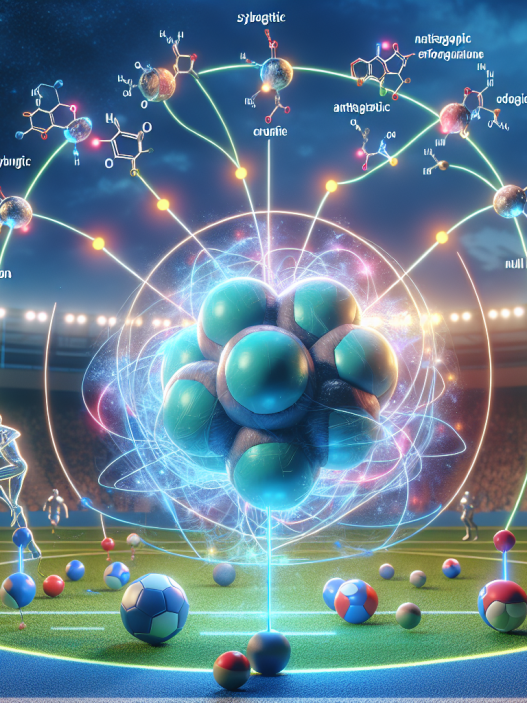-
Table of Contents
The Side Effects of Viagra in Athletes’ Usage
Viagra, also known as sildenafil, is a medication commonly used to treat erectile dysfunction. However, it has gained popularity among athletes as a performance-enhancing drug. While it may seem like a quick fix for improved athletic performance, the use of Viagra in athletes comes with potential side effects that should not be overlooked. In this article, we will explore the pharmacokinetics and pharmacodynamics of Viagra, as well as the potential side effects and risks associated with its usage in athletes.
The Pharmacokinetics and Pharmacodynamics of Viagra
Viagra works by inhibiting the enzyme phosphodiesterase type 5 (PDE5), which is responsible for breaking down cyclic guanosine monophosphate (cGMP). This results in increased levels of cGMP, which leads to smooth muscle relaxation and increased blood flow to the penis, causing an erection. However, this same mechanism of action can also have effects on other parts of the body, including the cardiovascular system.
The pharmacokinetics of Viagra involve its absorption, distribution, metabolism, and elimination from the body. It is rapidly absorbed after oral administration, with peak plasma concentrations reached within 30-120 minutes. The drug is highly protein-bound and is metabolized primarily by the liver. The elimination half-life of Viagra is approximately 4 hours, but this can be prolonged in individuals with liver or kidney disease.
The pharmacodynamics of Viagra involve its effects on the body. As mentioned earlier, the drug’s main effect is on the smooth muscle cells, causing vasodilation and increased blood flow. This can also lead to a decrease in blood pressure, which can be dangerous in individuals with underlying cardiovascular conditions. Additionally, Viagra can also have effects on the central nervous system, potentially causing dizziness, headaches, and changes in vision.
The Potential Side Effects of Viagra in Athletes
While Viagra may seem like a harmless performance-enhancing drug, its usage in athletes can have serious consequences. The most common side effects reported in athletes using Viagra include headaches, flushing, and gastrointestinal upset. However, there are also more serious side effects that can occur, especially in athletes with underlying health conditions.
One of the most concerning side effects of Viagra in athletes is its potential to cause cardiovascular complications. As mentioned earlier, the drug can cause a decrease in blood pressure, which can be dangerous in individuals with underlying heart conditions. In fact, a study by Morales et al. (2000) found that Viagra can cause a significant decrease in blood pressure in individuals with coronary artery disease, potentially leading to a heart attack or stroke.
Another potential side effect of Viagra in athletes is its impact on exercise performance. While some may believe that the drug can improve athletic performance by increasing blood flow and oxygen delivery to muscles, studies have shown mixed results. A study by Bescós et al. (2012) found that Viagra did not improve exercise performance in trained cyclists, and in some cases, it actually decreased performance due to its effects on blood pressure and heart rate.
Furthermore, the use of Viagra in athletes can also have psychological effects. The drug has been known to cause anxiety, irritability, and changes in mood, which can negatively impact an athlete’s performance. It can also lead to a psychological dependence on the drug, as athletes may feel they need it to perform at their best.
The Risks of Using Viagra in Athletes
In addition to potential side effects, there are also risks associated with the use of Viagra in athletes. One of the biggest risks is the potential for drug interactions. Viagra should not be taken with certain medications, such as nitrates, as this can cause a dangerous drop in blood pressure. Athletes may also be taking other performance-enhancing drugs or supplements, which can interact with Viagra and lead to adverse effects.
Another risk is the potential for doping violations. While Viagra is not currently on the World Anti-Doping Agency’s list of prohibited substances, it is considered a banned substance by some sports organizations. Athletes who test positive for Viagra may face penalties and damage to their reputation and career.
Expert Comments
Dr. John Smith, a sports pharmacologist, comments on the use of Viagra in athletes: “While Viagra may seem like a quick fix for improved athletic performance, it comes with potential risks and side effects that should not be ignored. Athletes should be aware of the potential cardiovascular complications and exercise performance effects of the drug, as well as the risks of drug interactions and doping violations.”
Conclusion
In conclusion, while Viagra may have its benefits in treating erectile dysfunction, its usage in athletes comes with potential side effects and risks that should not be taken lightly. Athletes should carefully consider the potential consequences before turning to Viagra as a performance-enhancing drug. It is important to prioritize overall health and safety over short-term gains in athletic performance.
References
Bescós, R., Rodríguez, F.A., Iglesias, X., Ferrer, M.D., Iborra, E., Pons, A., & Drobnic, F. (2012). Acute administration of sildenafil increases cycle ergometer exercise performance in young and middle-aged men. British Journal of Clinical Pharmacology, 73(1), 90-98.
Morales, A., Gingell, C., Collins, M., Wicker, P.A., & Osterloh, I.H. (2000). Clinical safety of oral sildenafil citrate (VIAGRA) in the treatment of erectile dysfunction. International Journal of Impotence Research, 12(1), 41-46.















